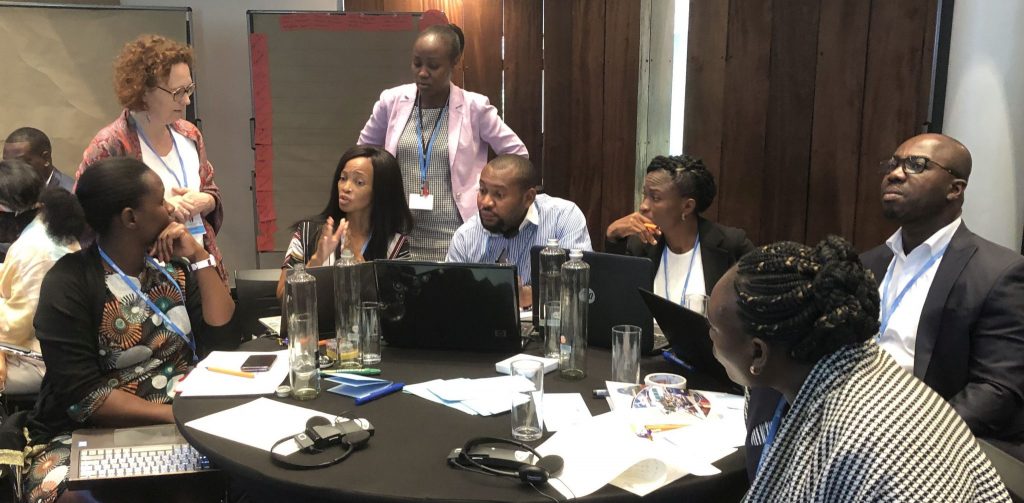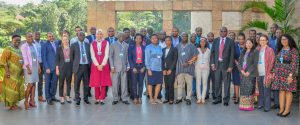21 February 2020
First Regional Training on Prioritising Mitigation Actions in Transport
African Ministry Representatives Discuss Emission Accounting and NDC Updates

34 participants from Ministries of Transport and Ministries of Environment across Africa underwent a hands-on training on how to use emissions quantification to prioritise mitigation actions and enhance ambition in the next round of NDCs. The first GIZ-UNFCCC regional workshop took place from 11th to 13th of February 2020 in the Green City in the Sun – Nairobi, Kenya. Reporting requirements to the UNFCCC were also covered.

Martin Eshiwani, Director of Road and Rail Transport Services, State Department of Transport
Key messages that came out during the discussions include:
- Most countries still lack data collection mechanisms that would enable them to conduct detailed emissions calculations in the transport sector. In some cases, it is not that the data is not there – but it is scattered. The data owner might have it and be using it for other purposes. It is upon countries to identify the different data sources and establish a mechanism to share data in order to facilitate detailed calculations. Zambia, for example, has put in place institutional arrangements for the national GHG management system. It has done so by signing various Memorandums of Understanding with key institutions involved in data collection and evaluation in the different IPCC sectors. Another example is Gabon that relies on insurance data in order to get information on the vehicle fleet in the country. Botswana, on the other hand, sometimes relies on data adapted from other countries such as Namibia to fill its data gaps. Even if adjusted carefully to the national context, this brings about uncertainties and is perceived to remain a challenge.
- The process of mitigation analysis and identification of mitigation options should be a consultative process to enable different stakeholders to agree on ambitious yet achievable targets. Having clear long-term targets in place provides policy direction, including investment security for private sector actors that need to be brought on board in order to achieve decarbonization of the transport sector.
- Each new NDC submitted should represent a progression beyond the current one and have the highest possible ambition. For this to be possible it is paramount that countries align their national priorities and national development goals. At the end of the day, synergies and trade-offs between sustainable development and climate change must be identified and addressed to be successful.
- The topic of just transition is therefore becoming increasingly important. For instance, reforming largely unregulated public transport systems asks for an intensive stakeholder dialogue with incumbent operators, identifying possibilities for continued employment. Keeping the social dimension of climate policy in mind is important. At the same time, many mitigation actions offer new business and employment opportunities, such as local assembly of electric vehicles.
 Experts discussing |
 Group work at regional workshop |
When all is said and done, will countries raise ambition?
The regional workshop found, that countries are still in the stage of discussing their 2nd NDC. However, some countries present at the workshop expressed their intention to include a sectoral transport mitigation target in their next NDCs if they have not had one yet and to broaden the scope of mitigation measures included.
Background
The training was organized by the UNFCCC secretariat and the Advancing Transport Climate Strategies (TraCS) project of GIZ. It covered an introduction to transport and climate change and current reporting requirements under the UNFCCC, GHG emission calculation methods, approaches to reduce GHG emissions, scenario analysis and prioritizing mitigation actions – which are appropriate and cost effective. The training also included the introduction of selected existing tools and guides, such as TrIGGER, a greenhouse gas emissions inventory tool developed by TraCS, and the Transport Volume of the Compendium on GHG Baselines and Monitoring, written by TraCS in cooperation with the UNFCCC.
In addition, peer to peer exchange sessions were held. This provided an avenue for the different countries to engage on the challenges faced when implementing climate change actions in transport. It became apparent that many countries face similar challenges. One repeatedly being mentioned was the lack of robust data, a pre-requisite for a sound basis for mitigation actions. The exchanges culminated in a presention by the University of Nairobi which highlighted the Kenyan experience on data availability for GHG emissions calculation regarding the in-service vehicle fleet in Kenya, a work that had been carried out during the first phase of TraCS project.


Author(s)




